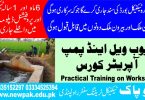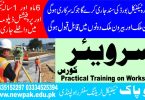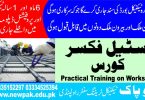
Civil Surveyor Course in Rawalpindi Islamabad
This civil surveyor course builds a strong foundation by exploring the role of surveying in civil engineering projects. Students study boundary, topographic, construction, and route surveys, along with measurement techniques, coordinate systems, and modern instruments like levels, theodolites, Total Stations, and GPS. Practical fieldwork and computer-aided tools help apply concepts to real-world tasks, making it ideal for those pursuing civil engineering surveying courses.
Course Overview
At New Pak Technical Training Centre, the 6-month survey course in Pakistan covers survey types, measurements, map projections, instruments, software, and fieldwork. The 1-year diploma adds advanced principles, instrument handling, calculations, drafting, and applied surveying software. Graduates are prepared for professional roles in civil engineering projects using up-to-date tools and techniques.
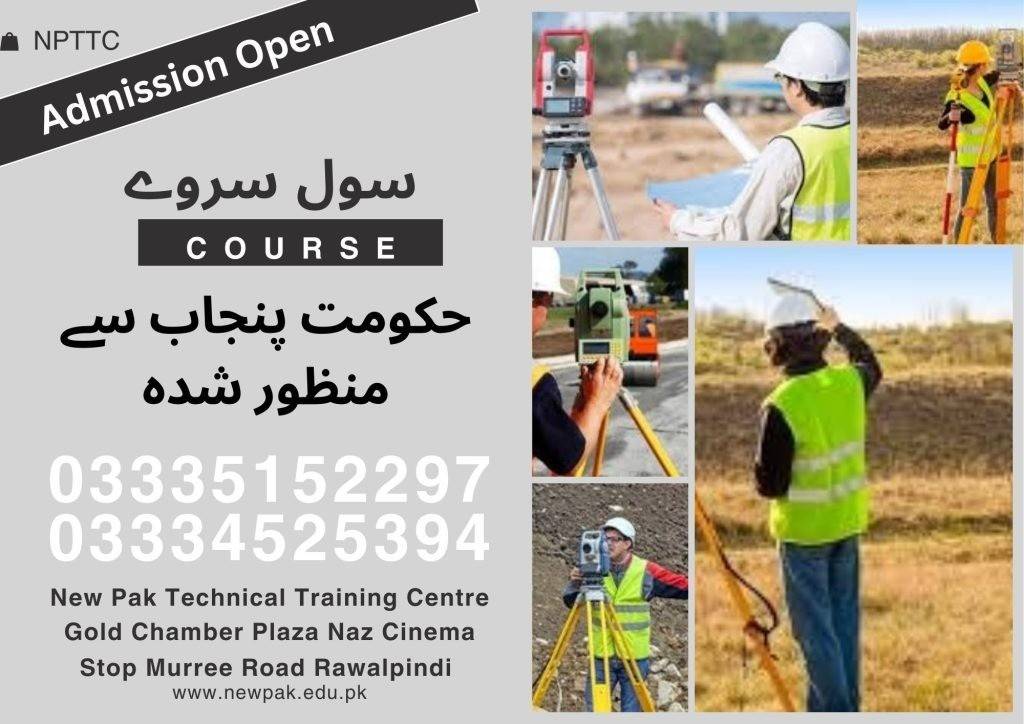
Course Duration
06 | Months
- Basic Intro Civil Surveying
- Types and Applications of Surveys
- Linear Measurements (Chains, Tapes, EDM)
- Leveling Techniques
- Traversing Methods
- Coordinate Systems & Map Projections
- Basic Trigonometry for Surveying (Optional)
- Surveying Instruments: Levels, Theodolites, Total Station
- Introduction to GPS for Surveying
- Surveying Software & Computer-Aided Surveying (CAS)
- Fieldwork Basics & Data Collection
01 | Year
- Introduction to Civil Surveying (Extended)
- Types and Applications of Surveys
- Linear Measurements (Chains, Tapes, EDM)
- Leveling Techniques
- Traversing Methods
- Coordinate Systems & Map Projections
- Basic Trigonometry for Surveying (Optional)
- Surveying Instruments: Levels, Theodolites, Total Station
- Introduction to GPS for Surveying
- Surveying Software & Computer-Aided Surveying (CAS)
- Fieldwork Basics & Data Collection
- Surveying Calculations (Area, Volume, Coordinates)
- Coordinate Transformations & Slope Calculations
- Drafting Techniques for Survey Plans
- Advanced CAS Applications & Map Generation
- Applied Field Practice (Advanced Scenarios)
Course Outline (6 Months)
ntroduction to Civil Surveying & Its Applications
Month 1
- Understanding the history and significance of surveying in civil engineering projects
- Exploring the various types of surveys conducted, such as boundary surveys, topographic surveys, construction surveys, and route surveys
- Learning about the applications of surveying in different aspects of civil engineering
Surveying and Measurement Techniques
Month 2
- Mastering linear measurements using chains, tapes, and electronic distance meters (EDM)
- Understanding leveling techniques for determining elevation differences
- Learning traversing methods to establish control points for accurate measurements
Basic Surveying Concepts and Map Projections
Month 3
- Introduction to coordinate systems used in surveying
- Understanding principles of map projections for representing the Earth’s surface on a flat plane
- (Optional) Introduction to basic trigonometry used in surveying calculations
Surveying Instruments and GPS
Month 4
- Chains and tapes for basic linear measurements
- Levels (automatic and digital) for determining elevations
- Theodolites (might be covered in a basic version for angular measurements)
- Total Stations (focusing on basic functionalities) for efficient data collection
- Introduction to GPS equipment (understanding basic principles) for positioning and data collection
Computer-Aided Surveying (CAS)
Month 5
- Introduction to basic surveying software for data collection and processing from field measurements
- Generating basic maps and plans
- Data analysis and visualization tools (may be introductory)
Fieldwork Practices and Data Processing
Month 6
- Setting up and using surveying instruments
- Conducting basic surveying measurements (linear, leveling, etc.)
- Recording and collecting field data accurately
- Introduction to data processing using surveying software
Course Outline (1-Year)
Months 1–6: Fundamental Civil Surveyor Course in Rawalpindi Islamabad
(Same course content as the 6-month program but with more detail, role-plays, software demos, and assessments.)
Introduction to Surveying & it's Types
Month 7
- Introduction to the history and importance of surveying
- Role in civil engineering
- Different types of surveys are conducted
Fundamental Surveying Principles
Month 8
- Linear measurements using chains, tapes, and electronic distance meters (EDM)
- Leveling techniques to determine elevation differences
- Traversing methods for establishing control points
- Introduction to topographic surveying for creating maps
Surveying Instruments (Practical Focus)
Month 9
- Hands-on experience with surveying instruments, including chains and tapes
- Levels (automatic and digital)
- Theodolites (optional, might be covered in a basic version)
- Total Stations (focusing on basic functionalities)
- Introduction to GPS equipment (understanding basic principles)
Surveying Calculations & Coordinate Systems
Month 10
- Area and volume calculations
- Coordinate transformations
- Slope calculations (optional)
Surveying, Drafting, and CAS Application
Month 11
- Introduction to basic drafting techniques for creating simple surveying plans and maps
- Surveying software for data collection and processing
- Generating maps and plans
Field Practice and Final Applications
Month 12
- Practical field exercises
- Applying theoretical knowledge to real-world surveying scenarios
- Setting up instruments, taking measurements, and collecting field data
- Introduction to data processing using software
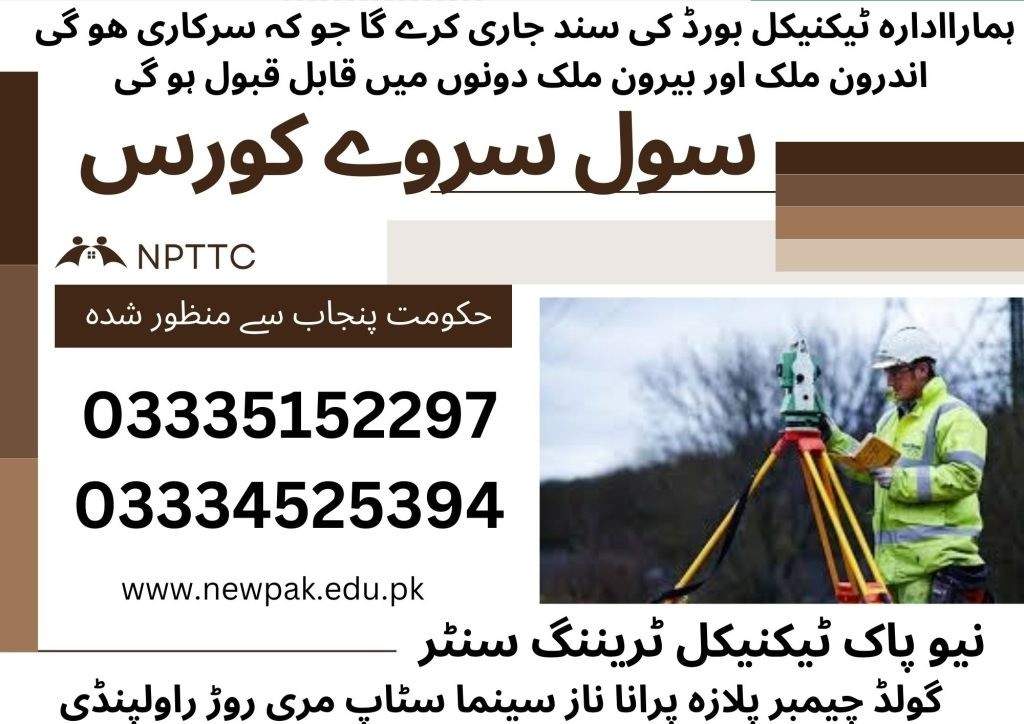
Career Opportunities
- Land Surveyor
- Construction Surveyor
- Field Engineer
- Trainer for Surveyor Diploma
- Assistant Project Manager
Conclusion
The Civil Surveyor Course in Rawalpindi Islamabad at our best technical institute in Rawalpindi offers a comprehensive pathway into modern surveying, blending theory with practical fieldwork and software training. Whether you choose the 6-month foundation or the 1-year advanced diploma, these civil engineering surveying courses equip you with the skills and tools needed to excel in land and construction surveying roles across the industry.



